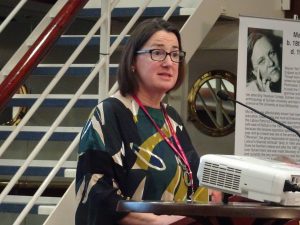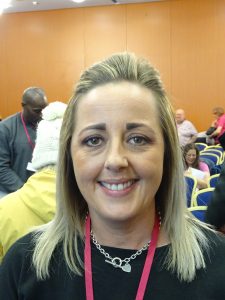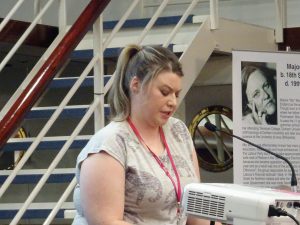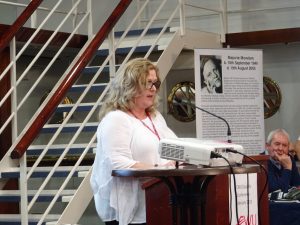Striving for proportionality for women in the CWU: Women’s Conference 2019
Equalities February 13 2019Despite all the hard work conducted in recent years to address the issue of proportionality in the CWU, the number of women active in the union is still way below acceptable levels.
That was the unanimous view of delegates at the CWU’s 2019 Women’s Conference in Liverpool last Wednesday – at which the importance of ensuring the union’s on-going Redesign agenda provides the positive platform required for a much-needed sea change loomed large in several passionate debates.
 The scale of the proportionality problem was illustrated by national officer for equal opportunities, education & training, Trish Lavelle, in her opening address – a sobering analysis in which she pointed out that, despite women now accounting for 20.3 per cent of the union’s overall membership, by some measures the active involvement of women in the union’s structures has actually gone backwards in recent years.
The scale of the proportionality problem was illustrated by national officer for equal opportunities, education & training, Trish Lavelle, in her opening address – a sobering analysis in which she pointed out that, despite women now accounting for 20.3 per cent of the union’s overall membership, by some measures the active involvement of women in the union’s structures has actually gone backwards in recent years.
“We now only have two women national officers, down from three last year and our leadership remains 100 per cent male,” she pointed out – adding: “In 2014 there were 16 women branch secretary, but now there are nine…and in four of our (10) Regions there are no women branch secretaries at all.”
The under-representation of BAME (black and minority ethnic) women, Trish stressed, was particularly acute – best illustrated by the fact that, despite the fact that women make up almost a quarter of the union’s BAME membership, there are no women at all on the union’s Race Advisory Committee.
Set against a wider societal context in which “even the act of a woman raising her voice and being present a public sphere attracts the vilest insults, and threats of rape and death,” Trish added: “Let’s think for a moment about Dianne Abbott and the obscene and vicious daily insults that she gets for no other reason than she is a BAME woman and an MP.”
Moving on to how the CWU is trying to tackle the under-representation of women within the union, Trish insisted that Novembers Redesign Special Conference had “set out a new path for CWU Equality- one aiming to bring equality into the mainstream.”
It was, she stressed, essential for “move away from silo working” – and speaking in his own opening address to Conference, general secretary Dave Ward, agreed.
“If you look at what we’ve got at the moment, I think we’ve created lots of parallel structures where sometimes – as well intentioned and as good as the work done within them is – we don’t really connect it to the whole of the union,” Dave stressed.
“We want women playing an active role in every part of the CWU, right up to the top…and I passionately believe that by having regional women’s networks, which will be far more vibrant than the current structure – we’ll be in a far stronger place to achieve this.”
Moving to the central philosophy of the Redesign project – and the changes currently being made to the equalities structure under it – Dave concluded: “I can’t think of a time when workers have been under so many pressures as they are today – feeling pressurised to work harder and faster for less. We need to change the balances of forces in the world of work – and we can’t achieve that by being ‘this bit of the union’ or ‘that bit of the union’.”
Fundamentally, Dave concluded, Redesign was all about “collectivism, strength, bringing our issues together, making the union stronger and doing something about it.”
Within the Women’s equality strand, delegates unanimously agreed that work must include:
- A drive to inform every new female joiner of the potential to actively participate in the life of the union
- A campaign to encourage more women to stand as branch chairs, secretaries and treasurers
- The Women’s Advisory Committee (WAC) working directly with branches to get more women to stand as industrial reps.
Proposing the successful motion, which delegates subsequently voted to send to General Conference in April, Angela Teeling of Greater Mersey & South West Lancs Branch stressed it was all about “breaking down barriers so that contact can happen – and, if there are branches still out there that aren’t supporting their women’s officer, the WAC can go direct in there and sort it out.”
Carla Webb of Greater London Combined added: “We need to dig deeper and find out what is that is stopping more women from coming forward.”
After passionate debate, with strong views expressed on both sites, a majority of delegates voted down a separate motion for the WAC to oppose the absorption of the current Women’s Regional Committee structure in to the new regional equalities networks – and another demand for a ‘female only’ section in equality network meetings.
Opposing both motions, Trish Lavelle concluded: “We have to move forwards and not backwards – we cannot cling on to things from the past that have not delivered what we need them to deliver.”
Standing up for victims of rape and sexual harassment
Revulsion at the recent outcome of a rape trial in Ireland where a man was acquitted of raping a 17-year-old girl after a jury heard she was wearing a thong with a lace front has led to impassioned calls for the end of ‘victim blaming” in the courts.
 CWU Women’s Conference delegates unanimously committed the Women’s Advisory Committee (WAC) to run a campaign to remind members that “No means No” after a highly emotional debate in which one brave delegate revealed that she herself had been a victim of rape.
CWU Women’s Conference delegates unanimously committed the Women’s Advisory Committee (WAC) to run a campaign to remind members that “No means No” after a highly emotional debate in which one brave delegate revealed that she herself had been a victim of rape.
Many delegates had tears in their eyes as Zoe Walmsley of West Yorkshire branch recounted how it was her disgust at reading of the recent case in Ireland that had prompted her to share her own personal experience for the first time ever.
“I was raped at the age of 15 – I had the support of my family and I did pluck up the courage to go to the authorities,” Zoe began.
“When my case was brought to Court I was made to feel as if I had instigated and provoked the attack by their defence barrister.
“You are made to relive the event in full – it’s a very traumatic experience and it’s hard for women to even get the courage to come forward.
“For this man in Ireland to be acquitted of this despicable charge because a woman chose to wear a thong with a lace front is absolutely disgusting.
“Whatever a woman chooses to wear is her prerogative and doesn’t give anyone the right to assume she wants to have sex with them.”
“No means No,” concluded Zoe, as delegates jumped to their feet to give her a spontaneous and very emotional standing ovation.
Proposing the motion on behalf of the North East Regional Women’s Committee, Rachel Moon hit out at the prevalence of ‘victim blaming’ in rape trials – applauding the response of a female Irish parliamentarian who’d responded by holding up a thong in the Republic of Ireland’s lower chamber asking fellow members to consider how rape victims must feel at having their underwear being studied in court.
Erin Massey of Northern Ireland Telecom Branch recalled the infamous recent trial in Belfast of three rugby players and one other defendant – all of whom were also acquitted of rape after a highly adversarial courtroom drama during the course of which the victim’s underwear was passed round the Jury for inspection.
“It beggars belief – it’s ridiculous,” she stressed. “Irrespective of whether someone has attended an after-party, or choses to wear a thong or whatever, rape is rape and no means no.”
 Holly Bate of Gloucestershire Amal drew parallels between the latest Irish case and another rape trial in 2002 involving another 17-year-old girl who tragically took her own life shortly after the case concluded. “When she was in Court she said to her parents that the fact she’d been made to live it made it feel like she was raped all over again,” Holly said. “What a horrible thing to read – a young woman shouldn’t be having to experience feelings like that – and, as a result, it destroyed her Mum and Dad’s life too when she died.”
Holly Bate of Gloucestershire Amal drew parallels between the latest Irish case and another rape trial in 2002 involving another 17-year-old girl who tragically took her own life shortly after the case concluded. “When she was in Court she said to her parents that the fact she’d been made to live it made it feel like she was raped all over again,” Holly said. “What a horrible thing to read – a young woman shouldn’t be having to experience feelings like that – and, as a result, it destroyed her Mum and Dad’s life too when she died.”
 Supporting Conference’s call for the WAC to campaign against ‘victim blaming’ and to promote the “No means No” message, WAC member Karen Kendrick lashed out at the “mythologies and stereotypes that come up time after time in rape cases,” concluding: “There’s clearly more to do.”
Supporting Conference’s call for the WAC to campaign against ‘victim blaming’ and to promote the “No means No” message, WAC member Karen Kendrick lashed out at the “mythologies and stereotypes that come up time after time in rape cases,” concluding: “There’s clearly more to do.”
Delegates also voted unanimously in favour of a West London Postal Branch motion calling for the reintroduction of protections for employees suffering sexual harassment by third party individuals that were repealed by the Coalition Government in 2013. Proposing the motion, Katie Dunning stressed that, following recent waves of sexual harassment allegations right the way from Westminster to Hollywood, it is now essential that legal responsibilities are re-imposed on employers to act when third parties sexually harass members of staff.
Women’s Conference then went on to unanimously instruct the WAC to work with the NEC to campaign for the expansion and promotion of the ‘Ask for Angela’ campaign that provides practical assistance for those suffering unwanted attention in bars and other licensed premises.
Under the scheme, which was launched by Lincolnshire County Council in 2016 – and subsequently rolled out in many other regions – bar staff are trained to intervene on hearing the words ‘Ask for Angela’ – with responses that can range from the discrete calling of taxis to direct intervention which can involve the removal of the perpetrator from the premises.
Full agenda
Two of the motions carried by last week’s CWU Women’s Conference in Liverpool demanded specific action by the union to improve the working lives of the increasing number of women being employed across Royal Mail.
Delegates voted unanimously to instruct the Women’s Advisory Committee (WAC) to work in conjunction with the Postal Executive and the CWU’s education department to develop a one-day course for RM shift and unit managers and local CWU representatives specifically on female issues in the workplace – including maternity leave, pregnancy and issues with the menopause and periods. That motion will now go to the CWU’s annual Postal Industry Conference in April.
Women’s Conference went on to unanimously commit the WAC to “work with the Postal Executive to negotiate with Royal Mail to provide sanitary products for free (or, at least cost price) in all our workplace toilets.”
Citing the CWU’s high-profile Period Poverty campaign – which is already garnering strong political support for the concept of the free provision of sanitary products – Holly Bate of Gloucestershire Amal said: “It’s abhorrent that in this day and age in this country we are still worrying about period poverty at work.
“Let’s ensure the campaign continues and we hold Royal Mail to account about this and make this small but important change.”
Supporting the motion on behalf of the WAC, Kath Kelly concluded: “This is already a high priority for the CWU…and a matter of dignity and respect for all women and trans-men who are menstruating.”
Other motions passed by Women’s Conference included:
- A Bristol & District Amal Branch demand for the WAC to campaign for the menopause to be made a ‘protected characteristic’ under the Equality Act – thereby affording women legal protections when it impinges on their working life. Delegates selected this motion to be forwarded to CWU Annual Conference.
- A Lancs & Cumbria Branch motion instructing the WAC to mount a campaign to highlight the issue of heart disease and heart attacks amongst women
- A Greater London Combined branch motion calling on the NEC to continue to robustly challenge economic austerity that destroys jobs, prosperity and peoples lives – especially in the event of any economic downturn stemming from Brexit.

